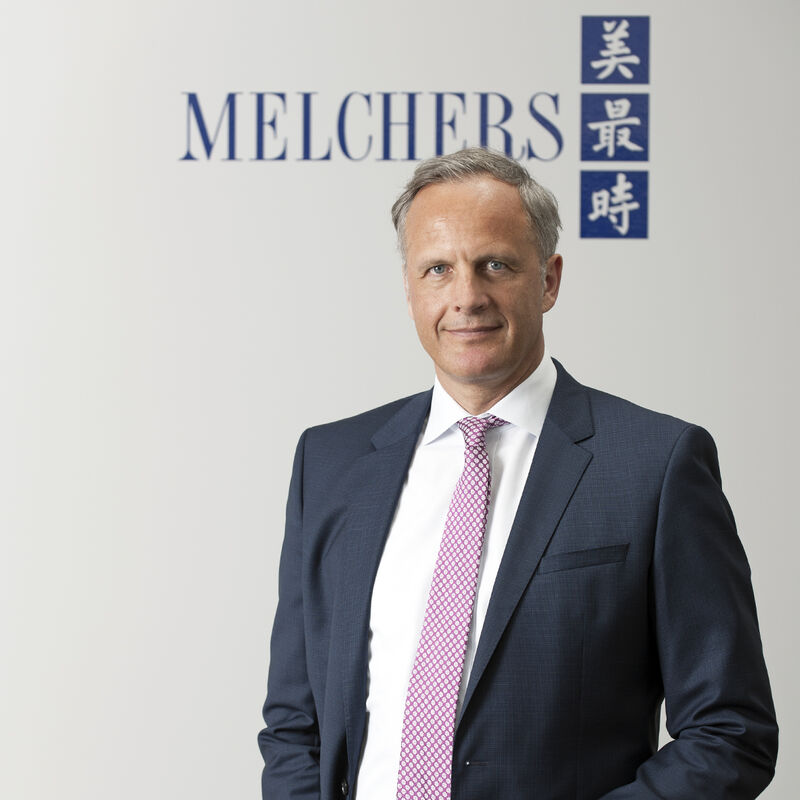“CHANGE IS PART OF OUR LIFE AS A SERVICE PROVIDER”

At the end of a turbulent year, we met for tea with our Managing Partner Dirk Sänger, discussing various topics that affected the Melchers Group in 2020.
2020 was a turbulent time for everyone. How do you, shortly before Christmas, reflect on the past year for Melchers and for yourself?
I have never travelled so little since I started working with Melchers. Last time I have been to Asia was at the beginning of the year, by then nobody would have thought that Covid-19 would affect us as much as it did. Initially we had a lot of uncertainty on our Asian supply chain. That developed into problems in our retail markets when they had to close during the lockdown and then of course challenges on the right strategy to secure appropriate financing for our various activities. After a while and during the summer a certain “crisis-routine” developed that made the second lockdown more manageable all the while it is still hurting us economically.
From a management point of view, the year was also different. We spent more time on reacting to challenges than managing our strategic set up. The focus was clearly on plugging the leaks in the ship’s hull this year.
Apart from Covid-19, what particular developments affected and possibly challenged Melchers?
One big change was initiated in the beginning of the 2000s, when Melchers was restructured into a holding company. This led to the spin-off of departments and the possibility to add strategic businesses via acquisitions.
This was also part of our long term strategic consideration on how to adapt to major changes in trade. Long-haul flights became cheaper, the language barrier no longer existed, easier communication and digitalization along the opening up of China. Hence, our classical function as a bridge between cultures no longer functioned in this way.
Thus, our well measured transformation towards a service provider with added values for our suppliers and customers.
Please tell us briefly your most difficult decision this year, the most important change & finally the greatest success in 2020?
The most difficult decisions are always personnel related ones, it affects people. I think I speak for everyone; we rather like to hire and pay bonuses than thinking about crisis management and restructuring of business units.
The most important change this year was the careful adaptation of our corporate identity that will be launched in Q1 2021. After 20 years, it was time to rework our CI and to actualize it however still keeping our 210-year history in mind.
Finally, the greatest success was that the Group emerged out of this challenging year with an OK result despite the worldwide pandemic. We feared worse in the beginning of this year. I am especially proud on the Melchers Team of 1.700 staff that made this possible!
Melchers & Co. was founded in 1806. How does a company with this history manage to be successful in so many different markets for more than 200 years, especially given the rate of change in recent years?
I like to compare our highly diversified group with a millipede. We do not have one large company but many small ones, which spreads risks over many areas of business. So, if one leg does not work, the millipede continues to run anyway, slower but steady. I think what keeps Melchers successful over the years is that we keep reinventing ourselves. We don´t make markets, we serve them. And thus, we are always at the lookout for new opportunities to incorporate into our Group.
In addition, the decentralized management structure helps us to react to market changes without delay. Our executives are experts in their respective markets and businesses which enables us to readjust our strategy accordingly.
Asia is our core market, and we support numerous companies both in entering the Asian markets and in their daily operations on the ground. In your opinion, what are the decisive qualities that a European SME should have in order to expand successfully into Asia?
To enter the market, you need a clear strategy. Furthermore, you need to have capital strength, stamina and an understanding of the Asian markets because Asia is not one country. Asia has different market conditions in each country.
And there, our experience, know-how, network, capital strength and local infrastructure comes into play in order to add value to any market expansion strategy into Asian markets
We are structured in a way that enables us to add new businesses or services easily and quickly to our service offerings.
What do you see as the biggest challenges for European companies entering the Asian market, especially in times of Covid-19?
Entering the Asian market independently is nearly impossible in the times of Covid-19 due to the lack of market exchange and travel restrictions. To enter the market successfully, you need an established partner on the ground or to be there yourself.
What conclusions do you draw for the past and coming business year?
In hindsight we can say that our long-term strategy of risk aversion and diversification has payed off and proved to be the right strategic set up. Capital strength and independence as a private company does certainly help, too. Our infrastructure in Asia helps us to add value to various businesses that want to expand into Asia, buying or selling their products.
If we meet again next year at the same time to review the year, what will have changed?
I believe that some sort of normality will return by next summer. Nevertheless, travelling will probably still be restricted, but point to point connections within Asia (bubble concepts) may be seen in the coming year.
Would you like to conclude by giving our employees/colleagues, customers and partners something to take away for the new year 2021?
Change is unavoidable and we have to be ready for it, as we have been in the last decades.
But most important: Stay safe and healthy!


